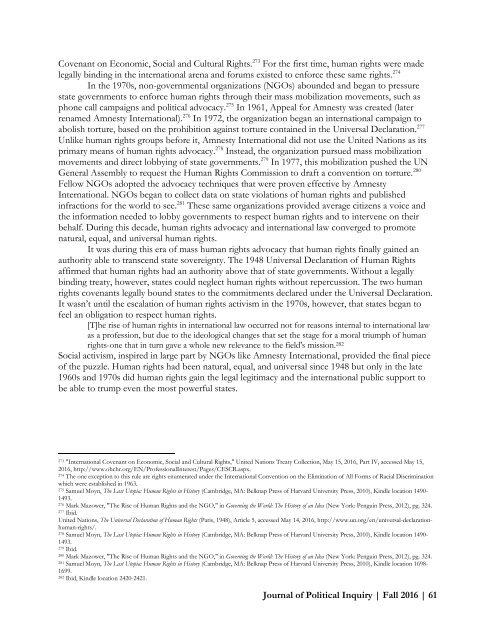Fall2016_Final2
Create successful ePaper yourself
Turn your PDF publications into a flip-book with our unique Google optimized e-Paper software.
Covenant on Economic, Social and Cultural Rights. 273 For the first time, human rights were made<br />
legally binding in the international arena and forums existed to enforce these same rights. 274<br />
In the 1970s, non-governmental organizations (NGOs) abounded and began to pressure<br />
state governments to enforce human rights through their mass mobilization movements, such as<br />
phone call campaigns and political advocacy. 275 In 1961, Appeal for Amnesty was created (later<br />
renamed Amnesty International). 276 In 1972, the organization began an international campaign to<br />
abolish torture, based on the prohibition against torture contained in the Universal Declaration. 277<br />
Unlike human rights groups before it, Amnesty International did not use the United Nations as its<br />
primary means of human rights advocacy. 278 Instead, the organization pursued mass mobilization<br />
movements and direct lobbying of state governments. 279 In 1977, this mobilization pushed the UN<br />
General Assembly to request the Human Rights Commission to draft a convention on torture. 280<br />
Fellow NGOs adopted the advocacy techniques that were proven effective by Amnesty<br />
International. NGOs began to collect data on state violations of human rights and published<br />
infractions for the world to see. 281 These same organizations provided average citizens a voice and<br />
the information needed to lobby governments to respect human rights and to intervene on their<br />
behalf. During this decade, human rights advocacy and international law converged to promote<br />
natural, equal, and universal human rights.<br />
It was during this era of mass human rights advocacy that human rights finally gained an<br />
authority able to transcend state sovereignty. The 1948 Universal Declaration of Human Rights<br />
affirmed that human rights had an authority above that of state governments. Without a legally<br />
binding treaty, however, states could neglect human rights without repercussion. The two human<br />
rights covenants legally bound states to the commitments declared under the Universal Declaration.<br />
It wasn’t until the escalation of human rights activism in the 1970s, however, that states began to<br />
feel an obligation to respect human rights.<br />
[T]he rise of human rights in international law occurred not for reasons internal to international law<br />
as a profession, but due to the ideological changes that set the stage for a moral triumph of human<br />
rights-one that in turn gave a whole new relevance to the field's mission. 282<br />
Social activism, inspired in large part by NGOs like Amnesty International, provided the final piece<br />
of the puzzle. Human rights had been natural, equal, and universal since 1948 but only in the late<br />
1960s and 1970s did human rights gain the legal legitimacy and the international public support to<br />
be able to trump even the most powerful states.<br />
273<br />
"International Covenant on Economic, Social and Cultural Rights," United Nations Treaty Collection, May 15, 2016, Part IV, accessed May 15,<br />
2016, http://www.ohchr.org/EN/ProfessionalInterest/Pages/CESCR.aspx.<br />
274<br />
The one exception to this rule are rights enumerated under the International Convention on the Elimination of All Forms of Racial Discrimination<br />
which were established in 1963.<br />
275<br />
Samuel Moyn, The Last Utopia: Human Rights in History (Cambridge, MA: Belknap Press of Harvard University Press, 2010), Kindle location 1490-<br />
1493.<br />
276<br />
Mark Mazower, "The Rise of Human Rights and the NGO," in Governing the World: The History of an Idea (New York: Penguin Press, 2012), pg. 324.<br />
277<br />
Ibid.<br />
United Nations, The Universal Declaration of Human Rights (Paris, 1948), Article 5, accessed May 14, 2016, http://www.un.org/en/universal-declarationhuman-rights/.<br />
278<br />
Samuel Moyn, The Last Utopia: Human Rights in History (Cambridge, MA: Belknap Press of Harvard University Press, 2010), Kindle location 1490-<br />
1493.<br />
279<br />
Ibid.<br />
280<br />
Mark Mazower, "The Rise of Human Rights and the NGO," in Governing the World: The History of an Idea (New York: Penguin Press, 2012), pg. 324.<br />
281<br />
Samuel Moyn, The Last Utopia: Human Rights in History (Cambridge, MA: Belknap Press of Harvard University Press, 2010), Kindle location 1698-<br />
1699.<br />
282<br />
Ibid, Kindle location 2420-2421.<br />
Journal of Political Inquiry | Fall 2016 | 61
















